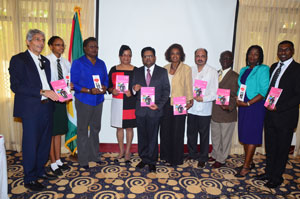New batch of Cuban Medical Professionals join local health sector
December 11, 2014, By KNews, Filed Under News, Source - Kaieteur News
A new batch of Cuban medical professionals has been enlisted in the local health sector, as part of efforts made by the Cuban Government to continually assist with the improvement of health care systems in Latin America and Africa.
Yesterday, the Ministry of Health (MOH)’s Regional Health Service Department hosted an orientation ceremony at the Regency Hotel and Suites, welcoming and introducing a new batch of 32 health care professionals to the local health care system.
Among those in attendance at the ceremony were Minister of Health, Dr. Bheri Ramsaran, Director of the Cuban Medical Brigade (CMB) and coordinator of the programme, Dr. Midalys Oreto Hernandez, Cuban Ambassador to Guyana, Julio C. Gonsalez Marchante.
The session provided the team of nurses, doctors and health care providers with an overview of the local health vision and regulations for health care workers, cultural practices in the local field of medicine, an understanding of health care services, delivery systems, organizational chain of command and basic information in other aspects of the health care in Guyana. The lectures were delivered by officials of the MOH and other specialists.
In her remarks, Dr. Hernandez said that Cuba’s Medical Internationalism Programme has been providing medical assistance to foreign countries since 1963, owing to a wealth of human resources in its health sector.
Dr. Hernandez said that the country has since forged international cooperation and solidarity with many peoples. In Guyana, she said that there are more than 170 medical Cuban collaborators working in at least six regions of the country.
The new batch of Cuban health care workers consists of doctors, nurses, laboratory specialists, and X-ray workers.
The CMB Director said that the new workers will be replacing collaborators who have completed their mission in Guyana. Dr. Hernandez noted that each attachÉ was allowed to serve a two –three-year stint before returning to Cuba.
In addition to helping structure Guyana’s healthcare system, the collaborators are also responsible for the final year training of medical students, who started their studies in Cuba at the Latin American School of Medicine.
The event marked further strengthening of bilateral agreement between Guyana and Cuba.
“Today is a special day where the friendship relationship between Cuba and Guyana continue consolidating. We are officially receiving 32 Cuban collaborators who start their mission as part of the CMB in this fraternal country. We are fulfilling our part in the commitment stated in agreement between our two governments,” Dr. Hernandez said.
The professionals were urged to continue showing the professionalism, commitment, humanism and sensitivity which characterizes Cuban professionals of the health field. The Director congratulated the team for accepting the noble task but noted it is not without its challenges.
“It is necessary to remind you of something. We are conscious that you are aware of the need to permanent studies and seeking information, to know the culture of this nation, its clinical picture to constantly investigate.”
Dr. Hernandez urged the workers to continue contributing to the elevation of health care in Guyana.
Source - http://www.kaieteurnewsonline....local-health-sector/



